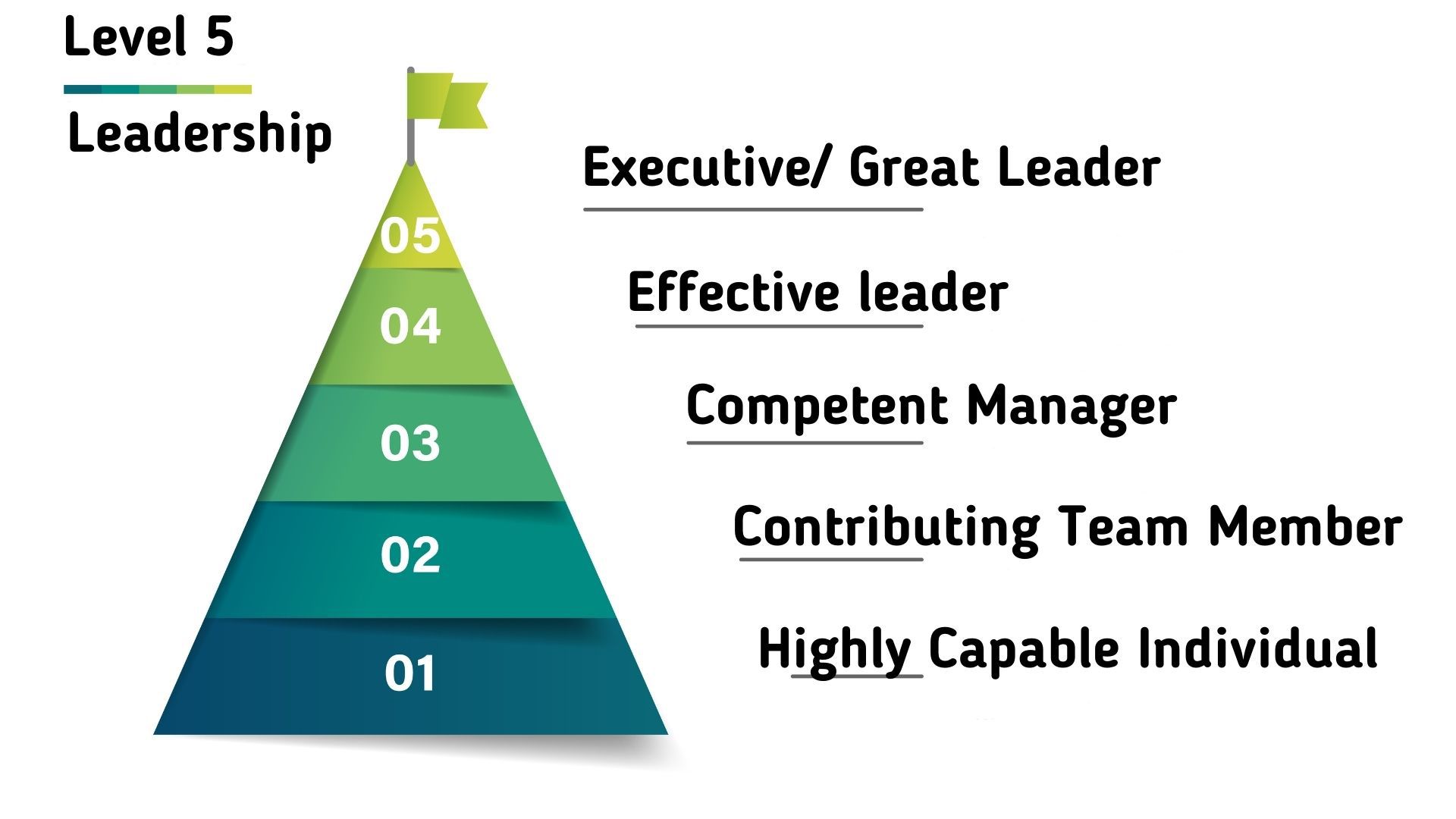Level 5 leadership is the residing point of some of the top CEOs globally, as it paves the path of great leadership.
Jim Collins developed the concept of Level 5 Leadership. He mentioned this classic concept in his business book Good to Great that he authored. It covers multitudes of topics on varying information about the classical nuances of a business.
The concept was introduced after studying almost 1,435 companies for over forty years.
The idea behind conducting this research study was to analyze the companies that have had a good run for a while but then took over and transformed into great companies. Jim’s idea was to study the companies which have a sustainable, successful period.
The eleven companies that successfully achieved greatness have a lot to do with their leadership patterns. Out of this, the inception of Level 5 Leadership occurred. This post will take you deep into the world of level 5 leadership and uncover the characteristics of level-5 leaders.
Table of Contents
What is Level 5 Leadership?
Across all the eleven great companies with sustained periods of success, Jim observed a common leadership fabric.
They all had similarities in their top leaders and their decision-making patterns. He thus called this pattern a Level 5 Leadership. Its importance was so prominent that he introduced it as the first concept in his book Good to Great.
Delving deeper into the concept, Level 5 Leadership assumes a hierarchy in the layout given below-
Hierarchy of Level 5 Leadership
Level 1: Highly Capable Individual
A leader that makes a productive contribution through talent, skills, and expression of good work discipline is in level 1 that is the bracket of Highly Capable Individuals.
Level 2: Contributing Team Member
At this level, the leader is an active group member. They contribute significantly to the group’s shared goals and work effectively under the influence of their peers.
Level 3: Competent Manager
The third level of leadership is Competent Manager. At this stage, they can effectively organize all the team members to motivate them to achieve shared goals that are pre-determined. However, they do not define these objectives of the team.
Level 4: Effective leader
At Level 4, the leader shows optimum levels of leadership. This is usually the stage where most of the leaders are found. Here, they can create a commitment to the perusal of clear goals and a strategic vision.
A high-performing team is also trained by the leader that aids their process of attaining success. They manage to inspire their team constantly to produce effective results.
Level 5: Executive/ Great Leader
Level 5 is the last level where the true leaders who stood the tests of time are found. It is not a precondition that a Level 5 leader moves sequentially in this hierarchy to attain Level 5 Leadership.
It implies that this leader has the best qualities of all the four levels plus a set of his fine qualities of humility and strong will.
What sets Level 5 Leaders apart from the rest?
The leaders in the first four leadership levels can produce results, but these aren’t enough to attain organizational greatness in growth and achievement.
For sustained periods of success, an extremely dynamic leadership fabric is important, a part of Level 5 Leaderships.
The following are the qualities that set the Level 5 Leaders apart from the rest of the leaders in other levels:
1. Duality
The duality that defines Level 5 Leaders is striving for an ambition that sees no bar on the one hand and being modest in their outlook on the other. In the want to see organizational excellence, Level 5 leaders are very humble about their contribution to the process.
They are self-effacing and countercultural personalities.
2. Driven
Level 5 leaders are madly driven to produce sustainable results that are progressive and developmental. Their drive towards the attainment of goals and efforts to reach there is not short-lived.
3. Build successors
These dynamic leaders successfully build a force of like-minded, driven leaders after them as successors. People trained under Level 5 leadership are rarely followers. They emerge to be profound leaders in the future.
4. Share the praise
These leaders share the praise they receive for excellent work with their team to motivate them for sustained good work in the future.
5. Take the blame
Excessive loyalty to their team and the organization is a striking feature of Level 5 leadership. Be it sharing the praise or taking the blame, they are first in life for both of these tasks. They take equal responsibility for a mishap in the organization, big or small.
6. Normal people with no external fame
When we visualize Level 5 leaders, we see them as godly people larger than life, moving around with some halo. That is not the case. Level 5 leaders are very humble in their lifestyle and do not like to attract unnecessary fame or take credit for their good work.
They work silently to achieve the levels of greatness for the organization.
7. Emerge from within the organization
These Level 5 leaders often emerge from within the organization after serving as a dedicated employee for long durations. This is a sign that Level 5 leaders are a result of passion and dedication. They are not birthed out of a stand-alone act of heroism.
Here is a video by Marketing91 on Level 5 Leadership.
Ways to become a Level 5 Leader – How to achieve Level 5 Leadership
When the right kind of balance is maintained between professional promptness and emotional intelligence, extraordinary leaders are born who fit Level 5 leadership’s brackets.
The following are the ways that can help attain the qualities of a Level 5 leader.
1. Develop Humility
An ideal leader is always the one who knows he is tracing the right path but does not boast about his righteousness. Humility is what defines the best qualities of a Level 5 leader.
They possess extreme amounts of referent power that is not authoritative, as well as emotional intelligence.
2. Have Loyal followers
Level 5 leaders have a dedicated set of loyal followers that are tracing their path of exemplary leadership. These leaders are deeply committed to and loyal to their followers and the employees of the organization that works under them.
By taking responsibility for the mishaps and success milestones and having a structured reward system in place, these leaders lead their space most effectively.
3. Recruit your team from within
Level 5 leaders are always their best pack of wolves from within the organization. They closely observe the team members who have equal amounts of promise in their potential to achieve greatness in a given time frame and with limited resources at their disposal.
Thus, this process of building the best dream-team over the years gives rise to a lineage of intelligent leaders as their successor.
4. Develop your drive to success
A level 5 leader does not collapse under pressure. Rather, they thrive. Being driven is the most important element of an ideal Level 5 leadership. They make quick decisions in a crisis and need intense amounts of accountability from their team members.
These leaders do not set monotonous goals. They set a vision that excites them from sleep and encourages them to attain extreme amounts of passion. Thus, these level 5 leaders are driven by an internal set of standards known even to their team members for their perusal.
5. Lead the organization with a passion
Passion is the food to their business soul. Level 5 leaders live a vibrant life in terms of the work they and the performance they exhibit. It is essential to have clarity in your vision and compassion in your outlook towards your employees and the organization to be anywhere close to a level 5 leadership style.
11 Level 5 Leadership Quotes- Jim Collins Good-to-Great Quotes
1. “Most great leaders do not start as great leaders. They grow into great leaders. Will you do whatever it takes to scale your leadership as the demands of your enterprise grows?”
2. “Take advantage of difficult economic times to hire great people, even if you don’t have a specific job in mind.”
3. “We found that for leaders to make something great, their ambition has to be for the greatness of the work and the company, rather than for themselves.”
4. “The moment you feel the need to manage someone tightly, you’ve made a hiring mistake. The best people don’t need to be managed. Guided, taught, led–yes. But not tightly managed.”
5. “The good-to-great companies made a habit of putting their best people on their best opportunities, not their biggest problems.”
6. “Level 5 leaders channel their ego needs away from themselves and into the larger goal of building a great company. It’s not that Level 5 leaders have no ego or self-interest. Indeed, they are incredibly ambitious–but their ambition is first and foremost for the institution, not themselves.”
7. “For no matter what we achieve, if we don’t spend the vast majority of our time with people we love and respect, we cannot possibly have a great life. But if we spend the vast majority of our time with people we love and respect – people we enjoy being on the bus with and who will never disappoint us – then we will almost certainly have a great life, no matter where the bus goes.
The people we interviewed from the good-to-great companies loved what they did, largely because they loved who they did it with.”
8. Greatness is not a function of circumstance. Greatness, it turns out, is largely a matter of conscious choice and discipline.”
9. “Expending energy trying to motivate people is largely a waste of time… if you have the right people on the bus, they will be self-motivated.”
10. “Consider the idea that charisma can be as much a liability as an asset. Your strength of personality can sow the seeds of problems.”
11. “The purpose of bureaucracy is to compensate for incompetence and lack of discipline–a problem that largely goes away if you have the right people in the first place.”
Summing up Level 5 Leadership!
All in all, according to Jim Collins, the two umbrella qualities that set these Level 5 leaders apart is a strong will and the ability to be humble at all times.
If you can cultivate these qualities at any stage in your organizational tenure, you have a greater shot at attaining the Level 5 style of leadership.
What are your thoughts about the significance of level-5 leadership in making successful business leaders?
Liked this post? Check out the complete series on Leadership

